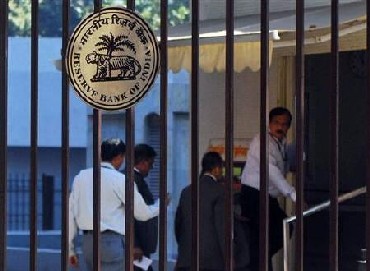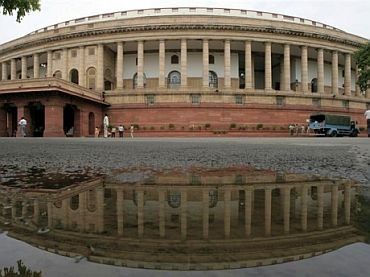 | « Back to article | Print this article |
Are financial regulators and government on the same page?
Until even few months ago, the media was abuzz with talks of inter-regulatory conflicts and differences of opinion. The finance minister's move to create a financial stability and development council (FSDC) had upset the Reserve Bank of India (RBI).
The Securities and Exchange Board of India (Sebi) was not too happy with the way the Insurance Regulatory Development Authority (Irda) was asserting its rights of supervision over certain investment schemes that straddled the worlds of both insurance and mutual funds.
Even the ministry of corporate affairs and Sebi could not see eye to eye on many issues that concerned how companies should list themselves on the stock exchanges.
At a theoretical level, such differences could well have created the impression of a healthy functioning system where open debate and expression of dissent lead to more informed decisions and better governance.
Click NEXT to read more...
Are financial regulators and government on the same page?
However, that was not how senior officials in the government or the regulatory bodies looked at such differences.
Most of the officials saw in them the manifestation of a turf battle - a desire to gain more control and acquire a larger urisdiction.
If the finance ministry gave the impression of trying to usurp the position of a super-regulator for the financial sector, the central bank through its carefully-worded statements resisted such moves.
Even Sebi made no secret of its displeasure over Irda's attempt at expanding its regulatory jurisdiction.
The change in the last couple of months is that the financial and corporate sector regulators seem to be at peace with the government.
Click NEXT to read more...
Are financial regulators and government on the same page?
So much so that when the RBI unveiled a few weeks ago its discussion paper on the proposed holding company structure for financial conglomerates, there were no murmurs of protest from any of the other regulators.
The discussion paper had mooted the idea that the central bank would regulate the entire holding company irrespective of the different subsidiaries and the different non-banking businesses they may undertake.
The proposal should have caused some concern for the insurance or the capital market regulators. In fact, however, there was no such reaction from any one of these regulators.
Similarly, the corporate affairs ministry and Sebi appear to be at peace with each other. Gone are the days when there would be heated debates over the question of who should have the final say on guidelines for listing of companies on stock exchanges or the manner of raising capital from the market.
Close observers of the central ministries note that the absence of any acrimonious debate between the government and the regulator is largely due to a change in personalities.
Click NEXT to read more...
Are financial regulators and government on the same page?
They point out that the finance ministry has seen new officials in charge of the capital markets division as well as the financial sector department.
Similarly, Sebi now has a new chairperson, who like his predecessor is also a former Indian Administrative Services officer, but he is far more cooperative and understanding of the current teams in the ministries of finance and corporate affairs.
It is this change in the personalities at the helm that seems to have made a big difference. Today, Corporate Affairs Secretary D K Mittal and Sebi Chairperson U K Sinha resolve their issues through mutual discussion before they can become a matter of public debate.
The Irda chairperson is also more comfortable with the new regime in the finance ministry, when he has to deal with it for resolving policy issues confronting the insurance sector.
The RBI governor has come to terms with his position vis-a-vis other financial sector regulators, which the government has now accepted and recognised.
Click NEXT to read more...
Are financial regulators and government on the same page?
The RBI governor is not the same as other financial sector regulators. That is why he heads a sub-committee of the FSDC, while other regulators are only members.
While personalities do make a difference in resolving issues, their contribution and effectiveness are limited only up to a point.
Often, problems in regulation and governance arise because of structural anomalies. For instance, there is no reason the markets regulator would be administratively linked more to the finance ministry and much less to the ministry of corporate affairs.
Sebi's links with the finance ministry are a legacy of the past. The office of the controller of capital issues was part of the finance ministry until the government abolished it soon after the formation of Sebi.
Click NEXT to read more...
Are financial regulators and government on the same page?
Ideally, therefore, Sebi should have closer liaison with the corporate affairs ministry. However, in practice the finance ministry has always had a bigger say in Sebi matters, quite apart from maintaining a capital markets division.
For a year or so when Jaswant Singh became the finance minister in 2002, he went to the other extreme by transferring the entire company affairs department to the finance ministry.
Once he left the ministry in 2004, the United Progressive Alliance government restored status quo ante, but the finance ministry's control over Sebi continued.
It is perhaps now time to remove that anomaly. If there is any ministry that should look after Sebi, it should be the corporate affairs ministry.






